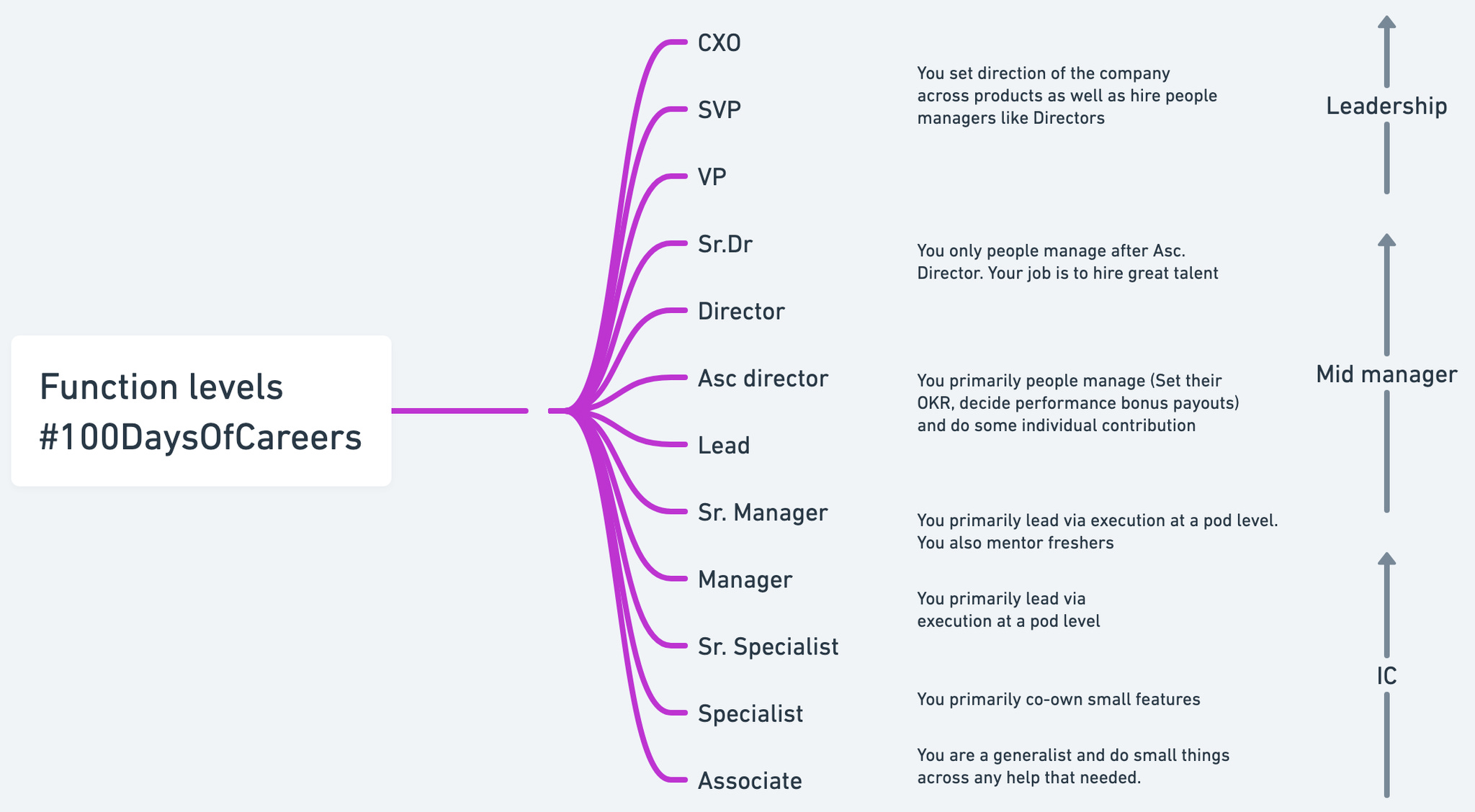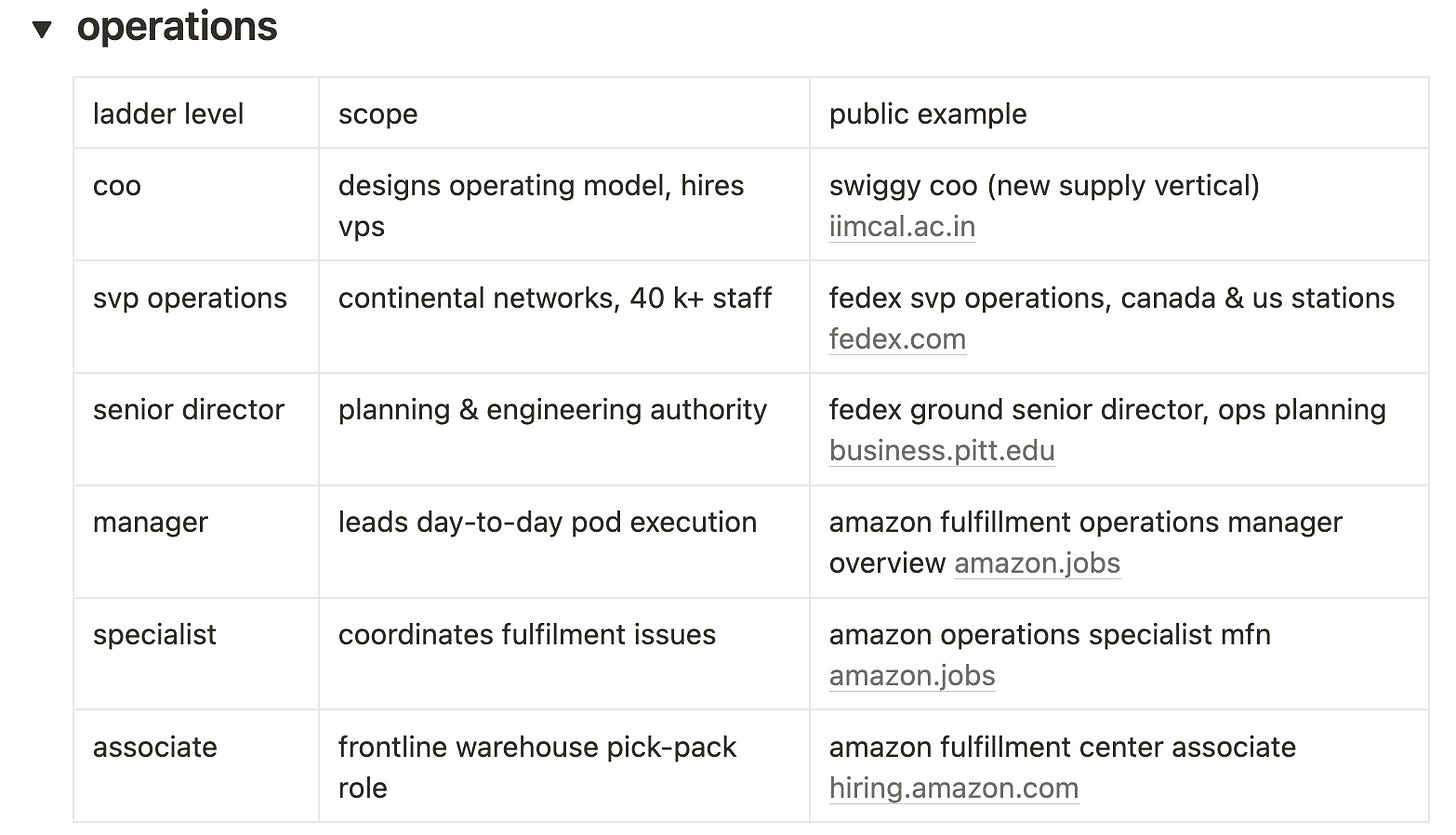build your career staircase
decode the invisible career ladder that exists in every company
you decoded your life yesterday. three columns. work, wealth, personal. some of you discovered the math doesn't work. the director salary won't buy the beach house. the startup equity won't fund two kids' college. the technical track won't give you the team you visualized leading.
what to expect today
today we decode the invisible career ladder that exists in every company. the one that determines your actual trajectory, not the one in your employee handbook.
if you haven’t done the visualisation & decoding, please do that first.
you're scrolling slack at 10 p.m.
watching promotion announcements float by. harsh that just made director. ahmed's now a vp. you type "congrats!" and feel that familiar knot. not jealousy exactly. more like watching a game where you’re not sure of the rules.
the rules exist.
every company runs on a similar invisible ladder. but most people discover it through painful trial and error. ten years into their career. after three lateral moves disguised as promotions. after realizing their "head of product" title at a 20-person startup means less than "senior pm" at google.
the universal ladder exists.
you just can't see it.
think about your last job search. you filtered by years of experience, maybe salary bands. but did anyone map out where "senior manager" actually sits in the hierarchy? or explain why some directors report to other directors?
the ladder has predictable levels:
some companies compress the above.
others add fancy prefixes.
but strip away the corporate creativity
and you'll find the same skeleton.
not knowing this costs your years.
you chase the wrong roles. you negotiate from the wrong position. you wonder why your "manager" title at a startup doesn't translate to "manager" at microsoft.
here's the truth
titles are contextual, but levels are universal. a series a startup might call you "head of marketing" when you're really operating at a manager level. a fortune 500 might label you "manager L3" for the exact same scope. understanding this saves you from taking lateral moves disguised as promotions.
remember that salary number you calculated yesterday? the one that supports your life, children, and emergency fund? that number maps to specific rungs on this ladder. not titles. rungs.
let me show you what shifts as you climb. not the politics or the meetings. the real work. the stuff that determines whether you can leave at 7 p.m. for family dinner or you're reviewing decks until midnight.
i’ve covered the marketing, business, product, design & ops.
marketing
business
operations
design
notice the pattern?
impact surface grows from "feature" to "company direction." people influence turns from being coached to shaping entire talent pipelines. decision horizon stretches from sprint planning to multi year capital allocation.
a pm2 owns a few features or a small product. a cpo owns whether the company builds hardware next year. both called "product people." worlds apart in practice.
summarising how scope grows
1. impact surface
widens from a single feature to full business lines.
2. people influence
moves from being coached to owning talent pipelines.
3. decision horizon
stretches from weekly sprints to multi year capital bets.
keep these three levers in view;
they are clearer than title inflation.
how transitions actually work
now for the part that matters:
moving between levels.
remember those three pillars from yesterday? work, wealth, personal.
each career stage optimizes them differently.
early stage (associate to sr. specialist)
want to build craft?
find a brilliant ic operator as your manager. i learned more about product sense from one staff engineer than three years of shipping features.
want faster money?
join mature orgs. they pay 30% more for the same level. spotify pays associates what startups pay specialists.
want a fancy title?
early stage startups hand out "head of" labels like candy. just know it won't translate when you leave.
want balance for that morning run you visualized? aim for startups with 200+ people. before that, you're doing three jobs.
mid senior (lead to director)
want to evolve your craft?
work under a brilliant leader this time, not just operator. the jump from doing to directing needs different models.
want people management experience?
series a companies with first time founders desperately need middle management. they'll take risks on you.
want predictable hours for the fam?
2000+ employee companies have enough redundancy that you're not the single point of failure.
remember that partner whose career you factored in yesterday? this stage is where dual careers get complex. one promotes, one relocates. plan for it.
leadership ( sr. director and above)
want real impact?
find distribution focused organizations.
your ideas mean nothing without reach.
want serious equity?
apac and emerging markets pay leadership premiums. a regional vp role can outpace a us director position.
want work life balance at this level?
1000+ employee companies only. smaller than that, you're always on. those kids you visualized? they'll see you on weekends at big companies. nowhere else.
finding your n and your n+5
pull out your decoded life from yesterday.
the one with three columns. work, money, personal.
step one
where are you today on that universal ladder? ignore your company's creative title. map yourself honestly. are you executing someone else's vision (associate/specialist)? designing solutions others implement (lead)? setting direction for multiple teams (director)?
that's your n.
step two:
look at your money target from yesterday. your lifestyle math. the house, the kids, the life you visualized. what level typically commands that compensation in your market
some reality check
directors in bangalore tech make 50 to 80 lakhs. vps make 1 to 1.2 crores. svps can make even 2 crores. in the valley, multiply by 3. your math determines your minimum target level.
step three:
check your work aspirations against the scope at each level. you wrote about the problems you want to solve. match them to the tables above. wanting to "shape product strategy" means different things at senior pm versus vp product. be specific.
step four
identify your n+5. maybe it's five levels up. maybe your timeline needs six or seven years. that's fine. the point isn't speed. it's clarity about the destination.
summarisng the four
step map from N to N + 5
1/ locate n.
strip vanity titles and be
honest about scope.
2/ define N + 5.
pick a real role at a real company
that matches your five year life vision.
3/ trace every intermediate step.
list the scope proof needed for each jump.
4/ accept timeline elasticity.
five years is a guideline.
of it takes six or seven, fine.
clarity matters more than speed.
some of you just realized your five year
visualization requires svp money but you're an associate today. that's seven levels.
possible? yes. probable in five years? maybe 7? but now you know.
the point isn not to have
a fixed number of years. but have a ballpark number as an anchor. some folks do it earlier, some take more time. that’s okay.
others discovered your dream role
is principal engineer or staff designer. high craft, high comp, low people management. your n+5 might be horizontal, not vertical. the ic track has its own ladder, its own progression, its own timeline.
i've watched people chase "VP by 30"
because it sounds impressive. some make it, maybe their company becomes a lucky decacorn. but most burn out at senior manager, having optimized for a title instead of a life. the timeline matters less than understanding the game. maybe your n+5 becomes n+7. you're still ahead of everyone climbing blind.
what most people miss
the biggest mistake? thinking vertical movement is the only movement. a google l5 moving to a startup series b as "head of product" might seem like a promotion. it's usually a lateral move with more chaos. basically stop chasing titles.
tonight you know where the levels sit,
what they pay, and which scope unlock each jump. tomorrow we zoom into your next twelve months. the exact skills, projects, and company profiles that move you from N to N + 1.
rest the mind,
review your decoded vision,
and be ready to plot the first move.
i’ll see you tomorrow.
this was day #8 of #100DaysOfCareers
like what you read?
drop a like, or comment to
tell us what landed.
share this with someone
who you think will find value.
they’ll thank you later.







